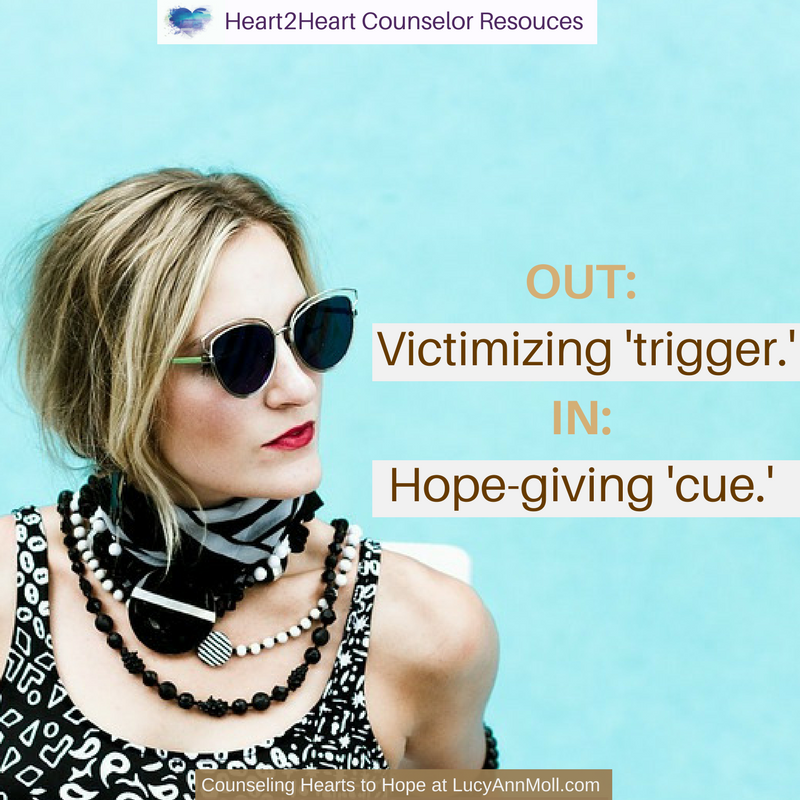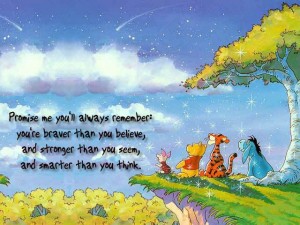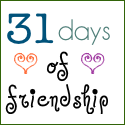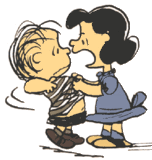by Lucy | Mar 22, 2018 | biblical counseling, Counselor Resources, emotions, thoughts
 Triggers: Often counselees speak of triggers, whether or not they have post-traumatic stress. It’s a societal buzzword. So what are triggers? How does the Bible term them? And what can you help your friend, counselee, or yourself handle them? The guest post by Andrea Lee whose article appeared first here on The Biblical Counseling Coalition website and is used with permission.
Triggers: Often counselees speak of triggers, whether or not they have post-traumatic stress. It’s a societal buzzword. So what are triggers? How does the Bible term them? And what can you help your friend, counselee, or yourself handle them? The guest post by Andrea Lee whose article appeared first here on The Biblical Counseling Coalition website and is used with permission.

As a biblical counselor, I often hear about “triggers.” These are situations, locations, words, and people that remind counselees of past pain or current heartache. These triggers threaten to engulf counselees in an avalanche of despair, anger, or anxiety. What is a trigger and how can a biblical counselor engage with people who seem to be subject to them?
Counselees view a trigger as an event or circumstance that is the cause of a particular response or emotional process
Click & Tweet!
. As a counselor to women, here are some situations I have encountered:
- It could be a mom who identifies her rambunctious toddler as a “trigger” – one energetic outburst and the mom is overwhelmed with exhaustion and despair.
- It could be a wife whose husband’s typical response in conflict is a “trigger”- one phrase or condescending look and the wife is flooded with anger or hopelessness.
- Or it could be a young single woman who sees Friday nights as a “trigger” – she has been alone and miserable for many Fridays and now dreads the end of every week.
In seeking to help these women, I explain to them that triggers do not cause their response. The so-called “trigger” is a reminder that tempts them toward a well-worn destructive thought pattern.
Click & Tweet!
The reminder is often associated with pain: previous failures, past hurts, or current broken relationships. Women feel helpless because they don’t know how to stop responding in a destructive way. I love to give hope by showing a new perspective on these moments.
When we label someone or something a “trigger,” we shift the place of emotional control from our own heart to an external object. The connection between event and emotion can mistakenly lead us to think the trigger is a cause. Actually, we have developed habits of thoughts in response to pain that continue to lead to these predictable emotional conditions. Our despair, anxiety, and anger reveal that we are ignoring God and disregarding His promises as we respond to the brokenness around us or in us. Instead of thinking in terms of triggers, I want counselees to see certain situations and people as cues – signals, prompts, and reminders – to begin a series of thoughts that are radically God-oriented. This shift in vocabulary begins to engage counselees in a process of repentance and trust when they are troubled by triggers.
Step 1: Recognize the triggers and the accompanying thinking
Women often know what launches them into a familiar path of pain. But here are questions that can help:
- What was the stimulus that began this descent into despair, anxiety, or anger?
- When do I have a disproportionate reaction to a situation or a person?
- Are others puzzled by the intensity of my response or mood swing?
Once the triggers are identified, it is vital to have the counselee write down their exact thoughts. You will probably hear some of these in the counseling room. For example:
- I can’t believe this is happening again. I can’t take it anymore. What if this never gets better?
- I’m stuck. Nothing ever changes. It’s unfixable. I’ll never change.
- Also I can’t breathe. I have to do something right now. I can’t stand the pressure.
If your trigger is related to an experience of sexual and/or physical abuse, please seek further help from a biblical counselor. You will also want to explore In the Aftermath, by Pam Gannon and Beverly Moore and Putting the Past in Its Place, by Steve Viars. If you are struggling with triggers associated with PTSD, Greg Gifford’s book, Helping Your Family Through PTSD, is a valuable resource.
Step 2: Repent by evaluating three categories
 God is gracious to help us identify triggers. It is a gift because it alerts us to repent in specific, concrete areas. Since repentance is the key to change, this gives us hope.[1] Repetitive elements in the counselee’s thinking will reveal weaknesses in theology and worship. Counselees often minimize or ignore God’s goodness, God’s presence, and God’s perfect ways.
God is gracious to help us identify triggers. It is a gift because it alerts us to repent in specific, concrete areas. Since repentance is the key to change, this gives us hope.[1] Repetitive elements in the counselee’s thinking will reveal weaknesses in theology and worship. Counselees often minimize or ignore God’s goodness, God’s presence, and God’s perfect ways.
Psalm 40:1-3 is a great passage to address these areas of unbelief.
- God IS good: “As for you, O Lord, you will not restrain your mercy from me; your steadfast love and your faithfulness will ever preserve me!”
- God IS present: “As for me, I am poor and needy, but the Lord takes thought for me. You are my help and my deliverer; do not delay, O my God!”
- And God IS working: “He inclined to me and heard my cry. He drew me up from the pit of destruction…He put a new song in my mouth”
The Psalmist doesn’t believe these things because he has a perfect past or a blameless record (see Psa. 40:12), but because God gives salvation out of His great mercy in Jesus Christ.
A prayer of repentance may sound something like this:
- Lord, this thought process reveals that I am not believing the truth about who you are. Please forgive me for going astray after a lie (Ps. 40:4).
- My thinking has become futile because I am not honoring you or thanking you (Rom. 1:21).
- I am in a pit of destruction and a miry bog of my own making when I continue to think hopeless, godless thoughts (Ps 40:2-3).
- Instead of spinning into despair and anxiety, help me to wait patiently for you and keep crying out to you. Thank you for your forgiveness and help.
Step 3: Mobilize your cue
Finally, help counselees prepare specific thoughts they will embrace the next time a trigger comes. Identify one thought that most fuels the downward cycle and prepare a God-honoring thought that will replace it. Develop simple statements that can be easily memorized and repeated. When they experience a trigger, the counselee should:
-
Engage in gratitude:
- Thank God for this opportunity to worship Him and to be changed.
- Thank Him for the reminder that we all need a Savior and God has provided one.
- And thank God for the reminder of past sin or hurt because it humbles us and pushes us to know Christ better
-
Embrace a promise:
- God’s grace is up to the challenge.[2]
- God will give me all the grace and strength I need to obey Him (1 Cor. 10:13, 2 Cor. 9:8).
- Also God hears my cries; He is working and He is good (Ps. 40).
There is great joy and hope in moving from trigger to cue by specific repentance and obedience. As you help counselees to recognize, repent, and then prepare for specific situations, you are equipping them to worship God and love others with greater wisdom and diligence. Painful reminders in life can be a cue to trust God by remembering and rehearsing His goodness, His presence, and His perfect ways.
Questions for Reflection
What triggers trouble your counselees? What thoughts fuel the negative spiral? And what cues have you mobilized in your counseling that have been particularly effective?
[1] Heath Lambert, “Die to Self and Grow in Love,” (presentation, Association of Certified Biblical Counselors Annual Conference, 2013; https://biblicalcounseling.com/product/die-to-self-and-grow-in-love-heath-lambert-2/)
[2] Kevin Carson, “Five Favorite Passages in Biblical Counseling” (presentation, Biblical Counseling and Discipleship Training, Atlanta, GA, Jan. 27, 2018).

About Andrea Lee
Andrea Lee lives in Atlanta, Georgia with her husband of 11 years. She serves women in the church and community as a biblical counselor.
Counselor, would you like to join Heart2Heart Counselor Directory too? Choose a free listing (or an upgrade). Make connections with like-minded counselors and new counselees. Learn more.
Counseling Hearts to Hope,
by Lucy | Oct 31, 2011 | relationships, whole health wellness |

Congrats! We did it! 31 Days of Friendship ends today, and I have a thank you gift for YOU.
Wow! 31 Days of Friendship ends today, and I have a special announcement:
I have a thank-you gift for you.
Glittery like gold? No.
Fancy like a Porche? No again.
Useful and a money saver? YES!
While choosing your gift, I asked myself, What would a caring woman like you want most? My educated guess: a level of security, protection, and help that UN-burdens the pocketbook.
And so my gift to you — remember, gifts are free 🙂 — is the WellCard. You can read more about the WellCard here.
The WellCard is not insurance. It is a discount card accessing many thousands of health care providers, services, and products. It is useful to you whether you have great insurance, are under-insured, are on Medicare, or have no health insurance.(Psst. . .I have the WellCard and save oodles of money.)
These are some of the benefits of the WellCard.
1. PRESCRIPTION DRUG DISCOUNT BENEFIT: Save instantly up to 65% on drug prices. The WellCard has a nationwide network of over 59,000 pharmacies, including major chains and community pharmacies. Your actual savings may vary depending on the medication and the pharmacy you use.
2. FIRST ACCESS MEDICAL DISCOUNT BENEFIT: Cardholders can benefit significantly on medical services by utilizing the contracted provider networks through First Access. Over 410,000 physicians nationwide and over 45,000 ancilliaries (lab, MRI, imaging, durable medical equipment, home health care) belong to the network. There is no limit to the number of times you can save when visiting participating providers.
3. OUTLOOK VISION DISCOUNT BENEFIT: Simply present your card at a participating provider to receive your discount.
4. DENTEMAX DENTAL DISCOUNT BENEFIT: Again, present your card at a participating provider to receive your discount.
You can compare the WellCard to a coupon that you can use over and over and over. Read more about the WellCard here.
The best thing about this gift is it costs you nothing. Not even a cent. You can only save money. I am not kidding. A treat, not a trick.
If you are interested in receiving this gift, please send me a message through my website and say you want the WellCard. Whoever asks for the WellCard from me will receive it. When you send me a message, I can then give you a “Group #” that lets you sign up for it and print out your WellCard. Once you print it out, you can use it immediately. It can be used for every member in your family.
Thank you, friend, for joining me on the 31 Days of Friendship journey. I appreciate you.
by Lucy | Oct 30, 2011 | relationships

Check out the favorite posts during our 31-days friendship journey!
 Hi friends, tomorrow is Day 31 and I’ll have a special announcement for all of you and for your friends. It’s amazing (and does not cost a cent)! Be sure to read tomorrow’s post and find out what it is.
Hi friends, tomorrow is Day 31 and I’ll have a special announcement for all of you and for your friends. It’s amazing (and does not cost a cent)! Be sure to read tomorrow’s post and find out what it is.
Let me share the readers’ top posts in 31 Days of Friendship. Have fun poking around. 😉
1. face to face or side by side? (day 3)
2. are facebook friends real friends? (day 5) FYI: This was MY personal favorite!
3. welcoming the lonely (day 11)
4. the best chocolate chip cookie EVER (day 17)
5. oh, dude: half a brain? (day 2)
6. a lonely apostle? (day 13)
7. an ingredient list for friendship (day 16)
Thank you for joining me on this journey. Also if you have a moment please sign up for my complimentary eLetter “Cup of Joy.” Encouragement, resources, fun.
When you subscribe, you’ll get my eBook “5 Amazing Names God Calls You.” Just type in your email address.
by Lucy | Oct 28, 2011 | biblical counseling, emotions, relationships
 Sometimes friendship hurts. Usually it is amazing, but sometimes. . .you’ll need to lovingly confront a friend.
Sometimes friendship hurts. Usually it is amazing, but sometimes. . .you’ll need to lovingly confront a friend.
 Let’s be honest.
Let’s be honest.
Sometimes friendship hurts. Usually it is amazing, but sometimes. . .well, you know how it goes: as messy as making cupcakes with a dozen preschoolers.
So what can you do to to restore a friendship? Yesterday I wrote on the two basic ways to mend a friendship. Now let’s dig deeper into how to lovingly confronting a friend. Tough, yes. Impossible, no.
Here are three steps. Please share your ideas in Comments. Your ideas encourage other women like you. 🙂
1. Pray. This may sound like a no-brainer, but do not skip this step. It may make or break your friendship. Do it. Ask yourself, Why am I confronting this person? What change do I hope for? What is the best time to have this difficult conversation and where?
2. Deal with your own anger BEFORE you lovingly confront your friend. You’ve been hurt; chances are your anger shows on your face, in your tone, even in how hard to slam your kitchen cabinets or how fast you drive or . . . (add your favorite anger expression). James 1:20 reads, “Man’s anger does not bring about the righteous life that God desires.” So talk to God about your anger. He listens and guides you to walk in His ways.
3. Ask God for the words to share with your friend. Tell her how you feel. You might say something like “I feel hurt that you forgot our lunch plans again.” Also tell your friend what you want to happen.
You might say, “I’d love to get together for lunch again. But let’s wait until you have less on your plate. Let’s continue to talk on the phone. When you know you can make a lunch, then tell me.”
A final practical point: Some friendships cannot be mended. You’ve tried but there’s an impasse.
God can use an impasse for good. An example of an impasse comes from Acts. Paul and Barnabas have a disagreement. Barnabas was John Mark to come on a missionary journey with them. Paul refuses, remembering the time that John Mark had bailed on them. So what happened? God multiplies his missionary teams in Asia Minor and Barnabas takes John Mark with him while Paul chooses Silas.
Sometimes friendships end. If this has happened to you, remember the good things about your friend and grieve the loss of the friendship but move on. God is with you. God is with her.
by Lucy | Oct 27, 2011 | biblical counseling, emotions, relationships |

 With God’s power you can mend a broken friendship. Learn His two ways of restoration. He loves you. He loves your friend.
With God’s power you can mend a broken friendship. Learn His two ways of restoration. He loves you. He loves your friend.
During high school my two best friends and I dubbed ourselves the three amigas. Together in school, at lunch, on the weekends, the number three might not work for many women friendships. But it worked for us.
Until senior year.
They met boys. College boys. College boys who roomed together on campus.
Three didn’t work anymore.
I felt forgotten. They didn’t mean to hurt me but I felt hurt. Should I still be their friend or kiss ’em goodbye? A tough question for a 17 year old. For any woman.
Have you been hurt by a friend and wondered how to mend a broken friendship? Yes and yes.
With God’s power you can mend a broken friendship by one of two ways. See which works for your situation or for someone you care about, like your daughters. (They learn how to mend friendships by watching us. Kinda scary but also an honor.)
1. If the wound is not horribly deep — or you feel compelled — cover an offense with love.
I was able to do this with my two best high school friends. They didn’t mean to hurt me, and I had other friends to hang with. But I still missed them and the way it used to be.
1 Peter 4:8 reads, “Love covers a multitude of sins.”
So when you can and as the Holy Spirit empowers you, let the hurt go. Let love cover the offense. Letting go can lead to restoration. After high school graduation, we three went our separate ways, as we attended different universities but we kept in contact and had no ill will.
But what it you can’t just let it go. Then what?
2. Here is the other practical step the mending a friendship and it is tough: Confront with love.
Years ago when I was a women’s ministry director at a local church, my team and I made a decision to switch the day of our morning Bible study for several good reasons. At least we thought they were good. But not Ann (not her real name).
Angry about the decision (and behind my back), she phoned each women in the bible study and complained about the day change and complained about me. She even went to the pastors and complained.
I felt hurt and sad and angry.
Eventually, Ann and I confronted one another in love. I apologized that the change took her by surprise, that I should have communicated better with everyone. She apologized for gossiping.
Our friendship was never the same, however. We hadn’t been super close but now we were tentative around each other, fearing more hurt. It was as mended as could be.
Solomon said, “Better is open rebuke than hidden love” and “Faithful are the wounds of a friend.” Proverbs 27:5,6.
I learned a lot from this mess. I continue to value Ann and see her from time to time. We say “hi” and make small talk. I confronted, forgave and moved on.
Do you have a broken friendship? Will you cover the offense with love? Or confront your friend in love? Please share and encourage others.
Psst. . .if you like my blog posts, you’ll love my not-quite-monthly eLetter Cup of Joy. The next one comes out next week. When you subscribe, you’ll get my eBook “5 Amazing Names God Calls You.” Just type in your email address. Many, many thanks.
You Are Blessed!

 Triggers: Often counselees speak of triggers, whether or not they have post-traumatic stress. It’s a societal buzzword. So what are triggers? How does the Bible term them? And what can you help your friend, counselee, or yourself handle them? The guest post by Andrea Lee whose article appeared first here on The Biblical Counseling Coalition website and is used with permission.
Triggers: Often counselees speak of triggers, whether or not they have post-traumatic stress. It’s a societal buzzword. So what are triggers? How does the Bible term them? And what can you help your friend, counselee, or yourself handle them? The guest post by Andrea Lee whose article appeared first here on The Biblical Counseling Coalition website and is used with permission. 
 God is gracious to help us identify triggers. It is a gift because it alerts us to repent in specific, concrete areas. Since repentance is the key to change, this gives us hope.[1] Repetitive elements in the counselee’s thinking will reveal weaknesses in theology and worship. Counselees often minimize or ignore God’s goodness, God’s presence, and God’s perfect ways.
God is gracious to help us identify triggers. It is a gift because it alerts us to repent in specific, concrete areas. Since repentance is the key to change, this gives us hope.[1] Repetitive elements in the counselee’s thinking will reveal weaknesses in theology and worship. Counselees often minimize or ignore God’s goodness, God’s presence, and God’s perfect ways.




 Hi friends, tomorrow is
Hi friends, tomorrow is 


